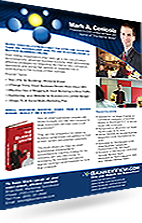General Musings
This section is where you'll find my thoughts on life from the eyes of an entrepreneur. The biggest challenge is balancing the success and obligations that success brings as the more successful one becomes, it seems the more obligations they have to the world. Feel free to comment as you follow my journey and general musings regarding that journey.

General Musings on Life & Entreprenuership
Low Interest Rates Actually Hurt Economic Growth
When the Federal reserve began loosening monetary policy during the financial crisis, it was done to increase the appetite for borrowing money, which in turn, would increase spending to drive economic growth.
What wasn't expected is that these low rates are now actually hurting the economy's growth potential instead of helping to drive it. How is this possible? In simple terms, when people are scared that they won't have enough money for retirement or don't feel wealthy, they tend to spend less and save more. When your money is earning nearly 0% interest in a savings account, you have that emotional feeling that you need more money in your savings account since it's not going to grow on its own. The longer answer to why lower interest rates make people save more is explained in better detail here.
With the U.S. consumer being 70% of our economy, having them save more is a detriment to economic growth. Business borrowing becomes easier and less expensive. However, businesses don't borrow money in order to pay existing employees more. They use it to financially engineer acquisitions or reduce existing borrowing costs without passing along those savings to employees. While job growth has been consistent over the last several years, wage growth has been stagnant. Many economists are pointing to wage growth as the needed driver for economic growth.
Even with wage growth, consumers may simply save more instead of buying more because low interest rates gives us the feeling of needing to save more.
Does that mean I want interest rates to increase? For me personally, low interest rates are good because I don't tend to have a bunch of money sitting in a savings account and can borrow cheaply to invest. However, as a business owner, a more robust economy means that we may increase income, more than offsetting the rise in our interest expense.
Does that mean we should raise interest rates for the sole purpose of growing the economy?
Probably yes. The argument against raising interest rates is the effect it will have on the stock market. The dotcom bust, when many investors (speculators) lost money, didn't have a large effect on the real economy. When real estate prices collapsed, that had a significant effect on everyday people. Therefore, what happens in the stock market doesn't have a majority effect on the overall economy like something affecting the U.S. consumer. Once rates start to rise, it will force anyone who's been sitting on the fence about borrowing money, to go quickly borrow money. People borrow money to spend it which will drive prices and improve economic activity. Stocks and bonds will be volatile during this period, but the real economy doesn't depend on the gyrations of the stock market.
There’s a 99% chance that you’re not part of the 1% and there’s a good reason for that. It’s because humans are predictably irrational. For the average person, doing the opposite of what you’d normally do will probably put you in a better financial position.
Here’s what you should do in a changing interest rate environment
If interest rates rise borrow less, buy less stuff, save more.
If interest rates fall, borrow more, buy more stuff, save less.
Unfortunately, 99% of you will do the opposite as you’ve always done.
 Website Powered by BannerOS. Your Business Energized!
Website Powered by BannerOS. Your Business Energized!

